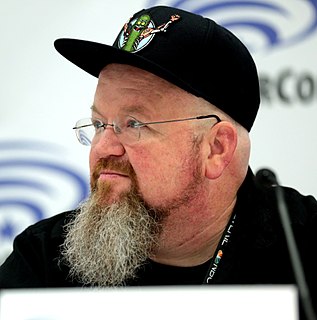A Quote by Elif Batuman
Anyone who has ever tried to plot a detective mystery knows that the hardest thing to come up with is motive.
Related Quotes
This element of surprise or mystery — the detective element as it is sometimes rather emptily called — is of great importance in a plot. It occurs through a suspension of the time-sequence; a mystery is a pocket in time, and it occurs crudely, as in "Why did the queen die?" and more subtly in half-explained gestures and words, the true meaning of which only dawns pages ahead. Mystery is essential to a plot, and cannot be appreciated without intelligence.
Anyone who has wrestled knows that it's the hardest thing in the world to do. Anyone who says something else is the hardest thing has never wrestled. That's what I have found. ... You don't wrestle because it's easy, you wrestle because it's hard. I don't do astrophysics because it's easy, I do it because it's hard. And I juxtapose the two in my mind, body, and soul all the time.
Fiction writers come up with some interesting metaphors when speaking of plot. Some say the plot is the highway and the characters are the automobiles. Others talk about stories that are "plot-driven," as if the plot were neither the highway nor the automobile, but the chauffeur. Others seem to have plot phobia and say they never plot. Still others turn up their noses at the very notion, as if there's something artificial, fraudulent, contrived.
I read a lot of detective stories because they always deliver. They give you a beginning, a middle, and an end - a resolution. The modern novels I read don't always deliver because I'm looking essentially for a story. As in Shakespeare, "The play's the thing." In particular I read detective stories for pacing, plot and suspense.
Well, I started out down a dirty road Started out all alone And the sun went down as I crossed the hill And the town lit up, the world got still I'm learning to fly but I ain't got wings Coming down is the hardest thing Well, the good ol' days may not return And the rocks might melt and the sea may burn I'm learning to fly but I ain't got wings Coming down is the hardest thing Well, some say life will beat you down Break your heart, steal your crown So I've started out for God knows where I guess I'll know when I get there I'm learning to fly around the clouds But what goes up must come down
It's no mystery why many of us in the media can't get enough of the fabricators Jayson Blair and Stephen Glass, the latter of whom concocted more than a score of bogus feature stories for the New Republic (and who wrote for other magazines, including this one, once) in the mid-1990s. Anyone--journalist, student, academic--who has ever stared at a blank screen, their brains grinding emptiness, and thought, How can I fill this hole? knows that in those desperate moments before a deadline, almost anyone can do almost anything: make stuff up, plagiarize, scribble senseless half-truths.

































